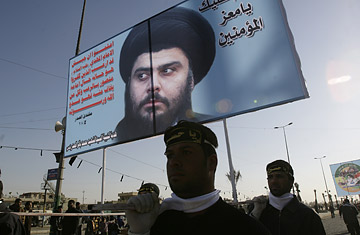
Followers of a radical anti-U.S. cleric Moqtada al-Sadr carry his portrait during a ceremony to mark a fourth anniversary of the Shi'ite uprising against the American occupation in Sadr City, Baghdad, Iraq, Thursday, February 21, 2008.
A collective gasp issued from close observers of the Iraqi parliament when news broke on Thursday that a key piece of legislation had stalled. The provincial powers bill, already ratified by the country's legislature, had been vetoed. That piece of legislation had been hailed by the Bush Administration as an important step in defining the nature of the Iraqi government. Basically, it gave the central government in Baghdad — as embodied by the Prime Minister and the national parliament — the right to remove a provincial governor from office. That did not sit well with one of the most important regional power blocs in Iraq and its representative on the Presidential Coucil, which must sign off on all prospective laws, cast a veto, declaring the bill unconstitutional and sending it back to parliament for adjustment.
But why the consternation, you may ask? Isn't that the nature of most legislative processes in democracies? As with anything in Iraq, there was a lot more to this veto than a quibble about constitutional law. The dissenting vote on the Presidential Council was cast by Vice President Adel Abdul-Medhi whose Supreme Iraqi Islamic Council (SIIC) is the Shi'a power bloc with relatively closer ties to the U.S. than the rival party run by Shi'ite strongman Moqtada al-Sadr, who leads the contentious, trigger-happy Mahdi Army. Abdul-Medhi said that the Provincial Powers law contravened the constitutional right of voters of each province to elect their own governor (a sort of states rights versus federal powers argument, in American constitutional parlance).
The dramatic veto, however, masked SIIC's weakness. It has been the dominant party in the country's south since the elections of 2005, which Sadr boycotted. SIIC, however, has squandered its mandate and has been unable to deliver services and improvements to its constituents. With Sadr now planning to run a slate of candidates there in elections originally scheduled for this October, SIIC fears that the implementation of the Provincial Powers law will only further weaken its hold on the south, especially if a strengthened central government can swoop in and remove inimical SIIC governors. The polls, which will elect legislators as well as governors, cannot be held until the law is passed. Abdul-Medhi's party would benefit from a delay, which would allow local SIIC officials to improve roads, schools and security in their areas.
SIIC has other reasons to dislike the vetoed legislation. A more powerful central government, as set out in the Provincial Powers law, would further benefit Sadr's bloc, which has its power base in central Iraq around Baghdad. SIIC's strength lies in Iraq's oil-rich southern provinces; thus a looser federation, with maximum autonomy for the regions, benefits it most.
The White House called the law's setbacks "democracy at work." And in some ways, that's right. There is a Civics 101 debate for Iraq's parliament to work through here. But in this case, Abdel-Medhi's veto has a whiff of desperate self-preservation, given how much his party stands to lose when the law passes. Now the law is back to the Iraqi parliament to be revised. It will need a two-thirds majority to pass when lawmakers return from their recess on March 18. While the debate may be contentious and the law's language may be altered, U.S. officials believe there will be enough votes to get the legislation through.
Brookings Institution Middle East scholar Michael O'Hanlon is optimistic that the Iraqis can figure it out. "I'm going to hold out hope that the system can fix this," he says, adding that the legislation has a powerful ally. "Sadr believes it's in his interest." Just a week ago, the leader of the Mahdi Army ordered a continuation of a six-month old ceasefire that has been key to recent security improvements in the capital. It's better for everyone if these power sharing arrangements can be negotiated in parliament than on the battlefield.
